Financial Markets, Trade Policies, and UK Economy Analysis Report
VerifiedAdded on 2023/01/03
|11
|3814
|348
Report
AI Summary
This report provides a comprehensive analysis of international trade and finance, with a specific focus on financial markets and capital allocation within both domestic and international economies, particularly in the context of the UK. It begins with an executive summary and a table of contents, followed by an in-depth examination of financial markets, including stock, bond, and derivative markets, and their role in allocating capital. The report then evaluates the challenges and opportunities presented by trade policies and industrialization within the UK, considering the country's economic performance and the impact of Brexit. It also discusses the importance of capital allocation in the UK economy and its implications for international trade. The report concludes with recommendations and a list of references.
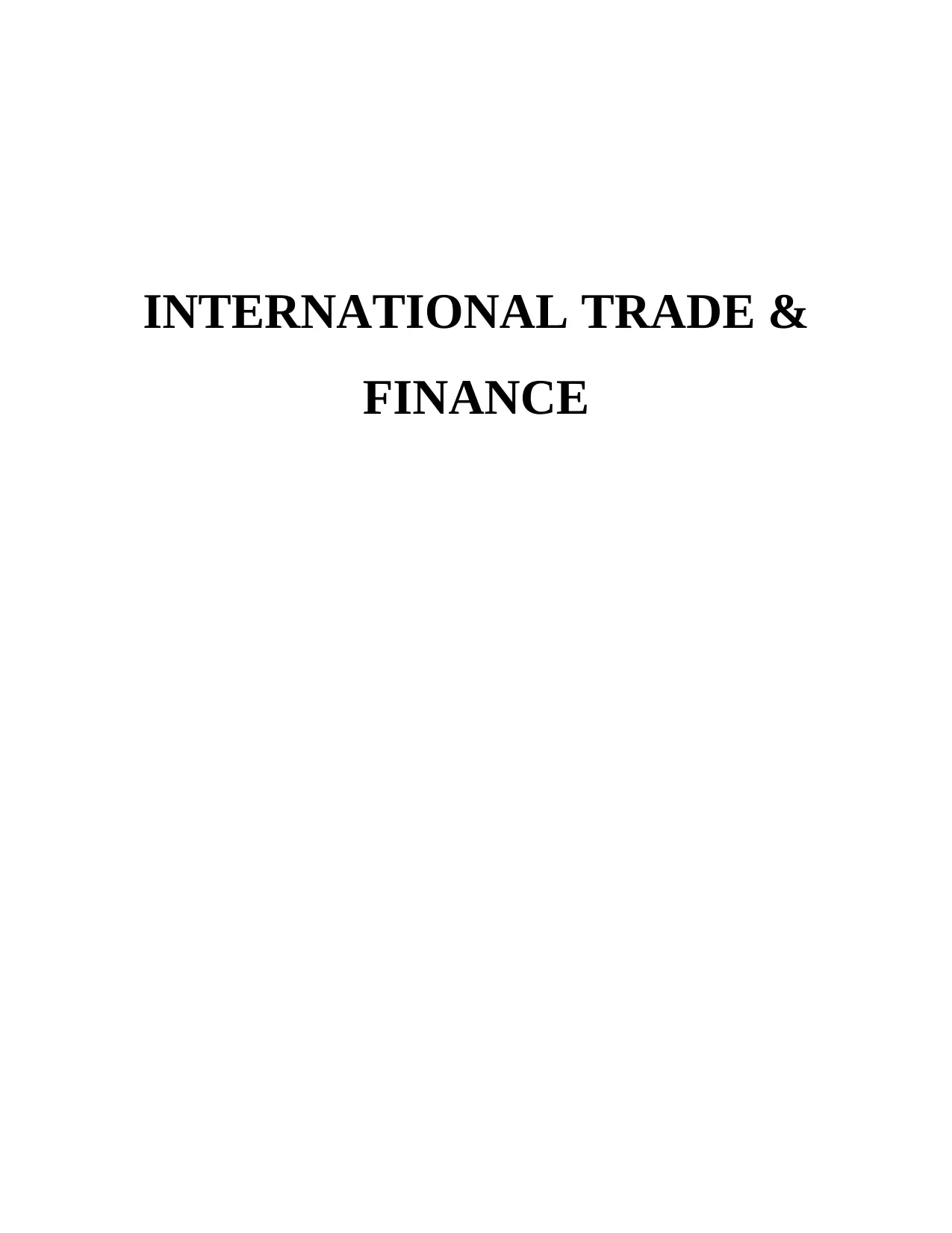
INTERNATIONAL TRADE &
FINANCE
FINANCE
Paraphrase This Document
Need a fresh take? Get an instant paraphrase of this document with our AI Paraphraser
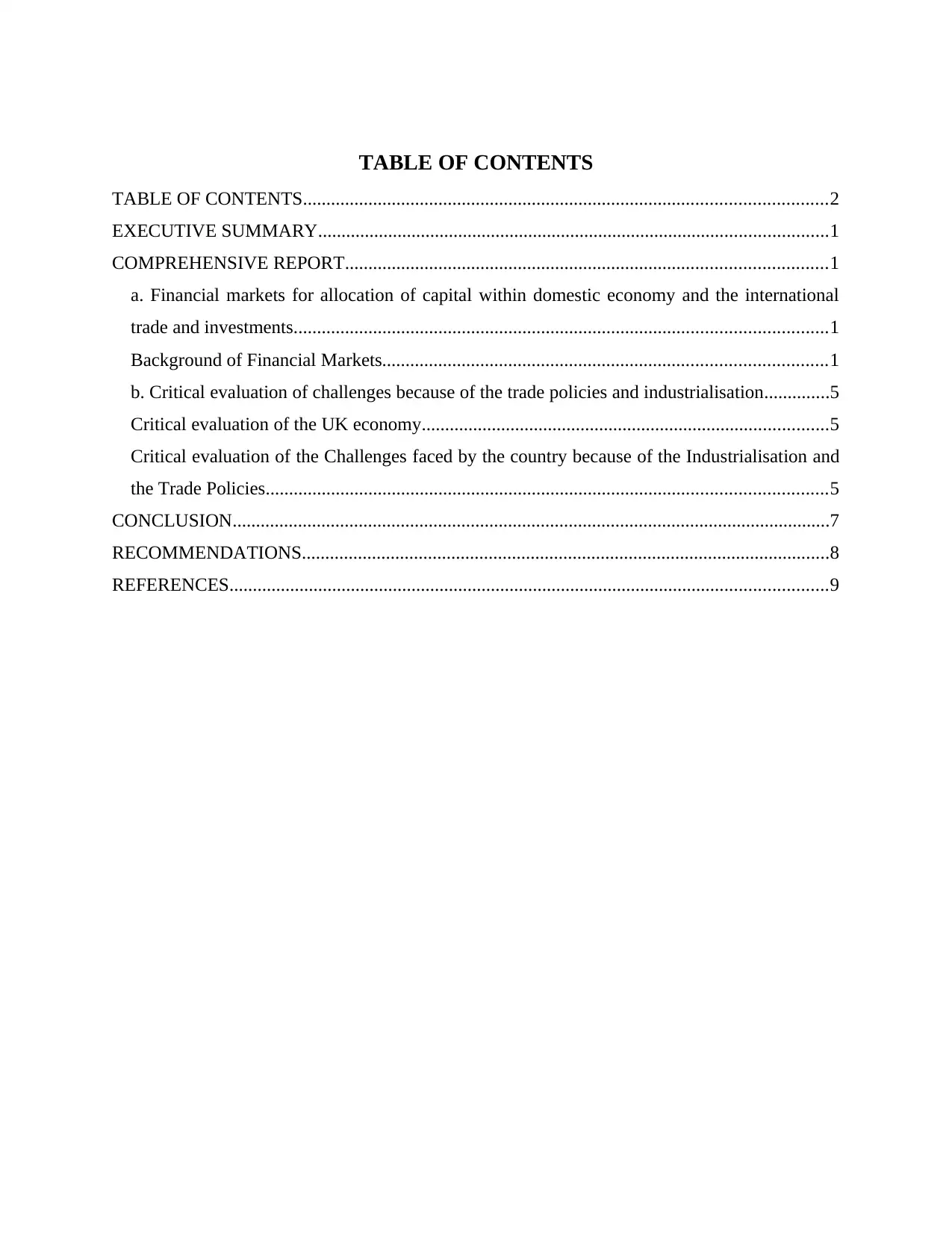
TABLE OF CONTENTS
TABLE OF CONTENTS................................................................................................................2
EXECUTIVE SUMMARY.............................................................................................................1
COMPREHENSIVE REPORT.......................................................................................................1
a. Financial markets for allocation of capital within domestic economy and the international
trade and investments..................................................................................................................1
Background of Financial Markets...............................................................................................1
b. Critical evaluation of challenges because of the trade policies and industrialisation..............5
Critical evaluation of the UK economy.......................................................................................5
Critical evaluation of the Challenges faced by the country because of the Industrialisation and
the Trade Policies........................................................................................................................5
CONCLUSION................................................................................................................................7
RECOMMENDATIONS.................................................................................................................8
REFERENCES................................................................................................................................9
TABLE OF CONTENTS................................................................................................................2
EXECUTIVE SUMMARY.............................................................................................................1
COMPREHENSIVE REPORT.......................................................................................................1
a. Financial markets for allocation of capital within domestic economy and the international
trade and investments..................................................................................................................1
Background of Financial Markets...............................................................................................1
b. Critical evaluation of challenges because of the trade policies and industrialisation..............5
Critical evaluation of the UK economy.......................................................................................5
Critical evaluation of the Challenges faced by the country because of the Industrialisation and
the Trade Policies........................................................................................................................5
CONCLUSION................................................................................................................................7
RECOMMENDATIONS.................................................................................................................8
REFERENCES................................................................................................................................9
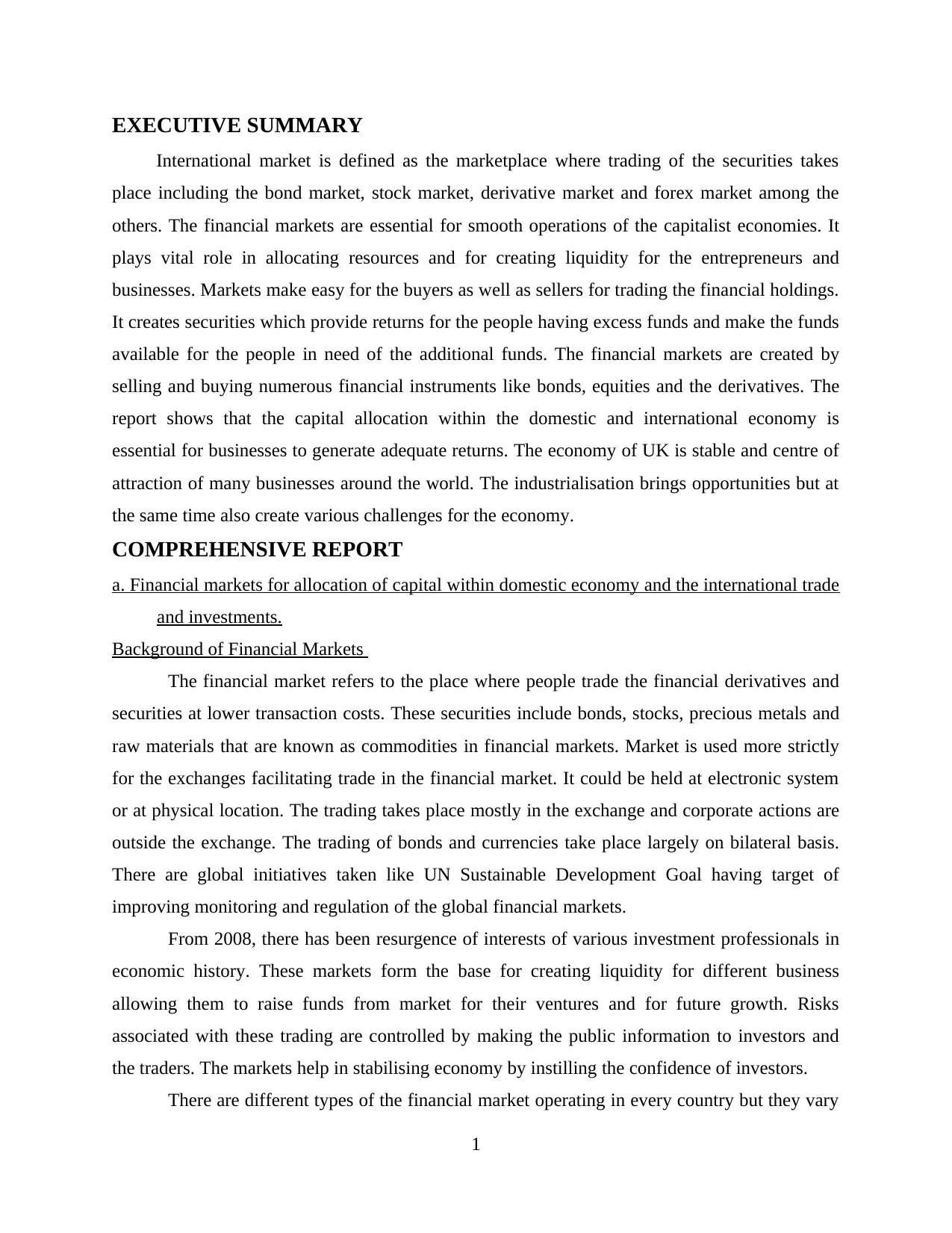
EXECUTIVE SUMMARY
International market is defined as the marketplace where trading of the securities takes
place including the bond market, stock market, derivative market and forex market among the
others. The financial markets are essential for smooth operations of the capitalist economies. It
plays vital role in allocating resources and for creating liquidity for the entrepreneurs and
businesses. Markets make easy for the buyers as well as sellers for trading the financial holdings.
It creates securities which provide returns for the people having excess funds and make the funds
available for the people in need of the additional funds. The financial markets are created by
selling and buying numerous financial instruments like bonds, equities and the derivatives. The
report shows that the capital allocation within the domestic and international economy is
essential for businesses to generate adequate returns. The economy of UK is stable and centre of
attraction of many businesses around the world. The industrialisation brings opportunities but at
the same time also create various challenges for the economy.
COMPREHENSIVE REPORT
a. Financial markets for allocation of capital within domestic economy and the international trade
and investments.
Background of Financial Markets
The financial market refers to the place where people trade the financial derivatives and
securities at lower transaction costs. These securities include bonds, stocks, precious metals and
raw materials that are known as commodities in financial markets. Market is used more strictly
for the exchanges facilitating trade in the financial market. It could be held at electronic system
or at physical location. The trading takes place mostly in the exchange and corporate actions are
outside the exchange. The trading of bonds and currencies take place largely on bilateral basis.
There are global initiatives taken like UN Sustainable Development Goal having target of
improving monitoring and regulation of the global financial markets.
From 2008, there has been resurgence of interests of various investment professionals in
economic history. These markets form the base for creating liquidity for different business
allowing them to raise funds from market for their ventures and for future growth. Risks
associated with these trading are controlled by making the public information to investors and
the traders. The markets help in stabilising economy by instilling the confidence of investors.
There are different types of the financial market operating in every country but they vary
1
International market is defined as the marketplace where trading of the securities takes
place including the bond market, stock market, derivative market and forex market among the
others. The financial markets are essential for smooth operations of the capitalist economies. It
plays vital role in allocating resources and for creating liquidity for the entrepreneurs and
businesses. Markets make easy for the buyers as well as sellers for trading the financial holdings.
It creates securities which provide returns for the people having excess funds and make the funds
available for the people in need of the additional funds. The financial markets are created by
selling and buying numerous financial instruments like bonds, equities and the derivatives. The
report shows that the capital allocation within the domestic and international economy is
essential for businesses to generate adequate returns. The economy of UK is stable and centre of
attraction of many businesses around the world. The industrialisation brings opportunities but at
the same time also create various challenges for the economy.
COMPREHENSIVE REPORT
a. Financial markets for allocation of capital within domestic economy and the international trade
and investments.
Background of Financial Markets
The financial market refers to the place where people trade the financial derivatives and
securities at lower transaction costs. These securities include bonds, stocks, precious metals and
raw materials that are known as commodities in financial markets. Market is used more strictly
for the exchanges facilitating trade in the financial market. It could be held at electronic system
or at physical location. The trading takes place mostly in the exchange and corporate actions are
outside the exchange. The trading of bonds and currencies take place largely on bilateral basis.
There are global initiatives taken like UN Sustainable Development Goal having target of
improving monitoring and regulation of the global financial markets.
From 2008, there has been resurgence of interests of various investment professionals in
economic history. These markets form the base for creating liquidity for different business
allowing them to raise funds from market for their ventures and for future growth. Risks
associated with these trading are controlled by making the public information to investors and
the traders. The markets help in stabilising economy by instilling the confidence of investors.
There are different types of the financial market operating in every country but they vary
1
⊘ This is a preview!⊘
Do you want full access?
Subscribe today to unlock all pages.

Trusted by 1+ million students worldwide
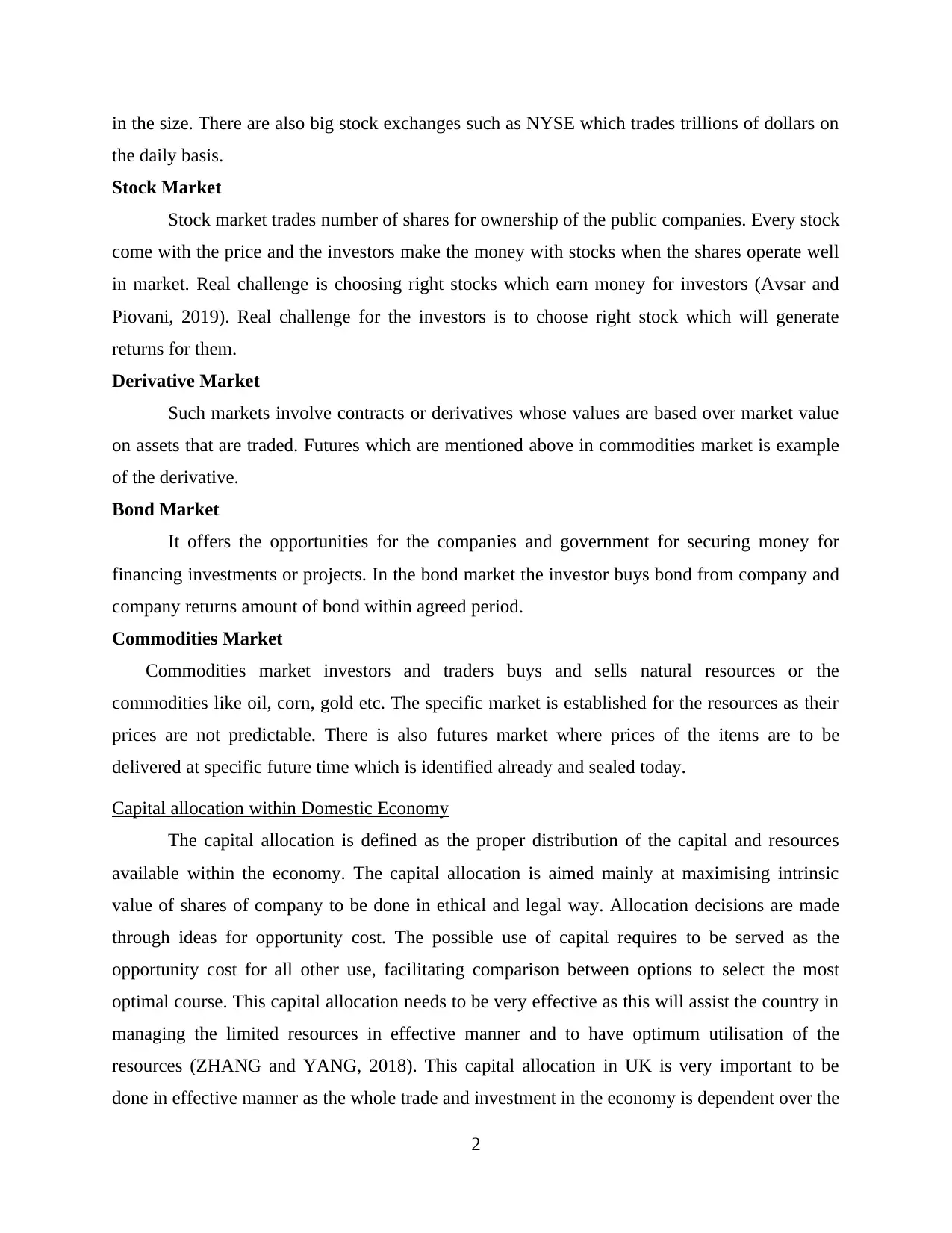
in the size. There are also big stock exchanges such as NYSE which trades trillions of dollars on
the daily basis.
Stock Market
Stock market trades number of shares for ownership of the public companies. Every stock
come with the price and the investors make the money with stocks when the shares operate well
in market. Real challenge is choosing right stocks which earn money for investors (Avsar and
Piovani, 2019). Real challenge for the investors is to choose right stock which will generate
returns for them.
Derivative Market
Such markets involve contracts or derivatives whose values are based over market value
on assets that are traded. Futures which are mentioned above in commodities market is example
of the derivative.
Bond Market
It offers the opportunities for the companies and government for securing money for
financing investments or projects. In the bond market the investor buys bond from company and
company returns amount of bond within agreed period.
Commodities Market
Commodities market investors and traders buys and sells natural resources or the
commodities like oil, corn, gold etc. The specific market is established for the resources as their
prices are not predictable. There is also futures market where prices of the items are to be
delivered at specific future time which is identified already and sealed today.
Capital allocation within Domestic Economy
The capital allocation is defined as the proper distribution of the capital and resources
available within the economy. The capital allocation is aimed mainly at maximising intrinsic
value of shares of company to be done in ethical and legal way. Allocation decisions are made
through ideas for opportunity cost. The possible use of capital requires to be served as the
opportunity cost for all other use, facilitating comparison between options to select the most
optimal course. This capital allocation needs to be very effective as this will assist the country in
managing the limited resources in effective manner and to have optimum utilisation of the
resources (ZHANG and YANG, 2018). This capital allocation in UK is very important to be
done in effective manner as the whole trade and investment in the economy is dependent over the
2
the daily basis.
Stock Market
Stock market trades number of shares for ownership of the public companies. Every stock
come with the price and the investors make the money with stocks when the shares operate well
in market. Real challenge is choosing right stocks which earn money for investors (Avsar and
Piovani, 2019). Real challenge for the investors is to choose right stock which will generate
returns for them.
Derivative Market
Such markets involve contracts or derivatives whose values are based over market value
on assets that are traded. Futures which are mentioned above in commodities market is example
of the derivative.
Bond Market
It offers the opportunities for the companies and government for securing money for
financing investments or projects. In the bond market the investor buys bond from company and
company returns amount of bond within agreed period.
Commodities Market
Commodities market investors and traders buys and sells natural resources or the
commodities like oil, corn, gold etc. The specific market is established for the resources as their
prices are not predictable. There is also futures market where prices of the items are to be
delivered at specific future time which is identified already and sealed today.
Capital allocation within Domestic Economy
The capital allocation is defined as the proper distribution of the capital and resources
available within the economy. The capital allocation is aimed mainly at maximising intrinsic
value of shares of company to be done in ethical and legal way. Allocation decisions are made
through ideas for opportunity cost. The possible use of capital requires to be served as the
opportunity cost for all other use, facilitating comparison between options to select the most
optimal course. This capital allocation needs to be very effective as this will assist the country in
managing the limited resources in effective manner and to have optimum utilisation of the
resources (ZHANG and YANG, 2018). This capital allocation in UK is very important to be
done in effective manner as the whole trade and investment in the economy is dependent over the
2
Paraphrase This Document
Need a fresh take? Get an instant paraphrase of this document with our AI Paraphraser
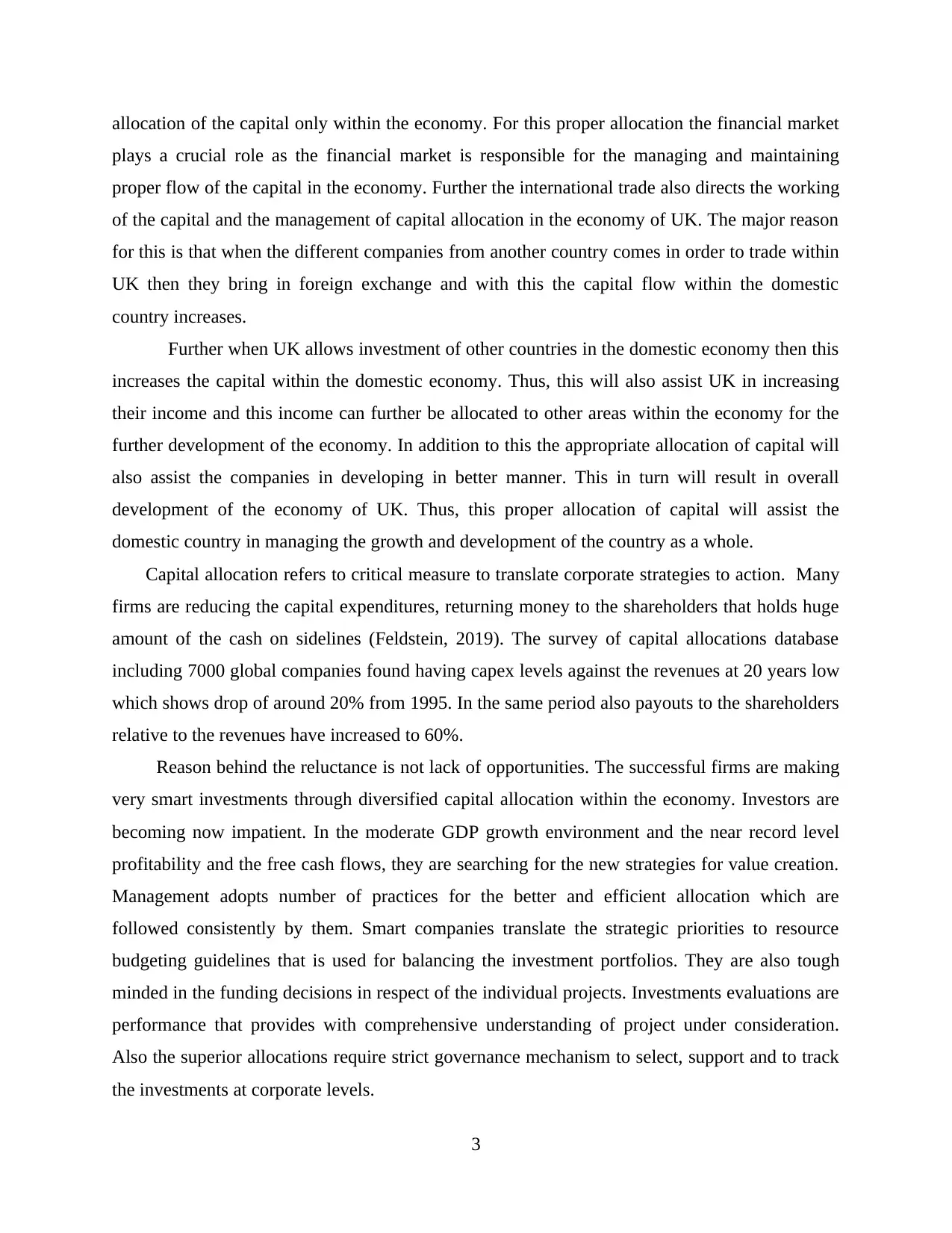
allocation of the capital only within the economy. For this proper allocation the financial market
plays a crucial role as the financial market is responsible for the managing and maintaining
proper flow of the capital in the economy. Further the international trade also directs the working
of the capital and the management of capital allocation in the economy of UK. The major reason
for this is that when the different companies from another country comes in order to trade within
UK then they bring in foreign exchange and with this the capital flow within the domestic
country increases.
Further when UK allows investment of other countries in the domestic economy then this
increases the capital within the domestic economy. Thus, this will also assist UK in increasing
their income and this income can further be allocated to other areas within the economy for the
further development of the economy. In addition to this the appropriate allocation of capital will
also assist the companies in developing in better manner. This in turn will result in overall
development of the economy of UK. Thus, this proper allocation of capital will assist the
domestic country in managing the growth and development of the country as a whole.
Capital allocation refers to critical measure to translate corporate strategies to action. Many
firms are reducing the capital expenditures, returning money to the shareholders that holds huge
amount of the cash on sidelines (Feldstein, 2019). The survey of capital allocations database
including 7000 global companies found having capex levels against the revenues at 20 years low
which shows drop of around 20% from 1995. In the same period also payouts to the shareholders
relative to the revenues have increased to 60%.
Reason behind the reluctance is not lack of opportunities. The successful firms are making
very smart investments through diversified capital allocation within the economy. Investors are
becoming now impatient. In the moderate GDP growth environment and the near record level
profitability and the free cash flows, they are searching for the new strategies for value creation.
Management adopts number of practices for the better and efficient allocation which are
followed consistently by them. Smart companies translate the strategic priorities to resource
budgeting guidelines that is used for balancing the investment portfolios. They are also tough
minded in the funding decisions in respect of the individual projects. Investments evaluations are
performance that provides with comprehensive understanding of project under consideration.
Also the superior allocations require strict governance mechanism to select, support and to track
the investments at corporate levels.
3
plays a crucial role as the financial market is responsible for the managing and maintaining
proper flow of the capital in the economy. Further the international trade also directs the working
of the capital and the management of capital allocation in the economy of UK. The major reason
for this is that when the different companies from another country comes in order to trade within
UK then they bring in foreign exchange and with this the capital flow within the domestic
country increases.
Further when UK allows investment of other countries in the domestic economy then this
increases the capital within the domestic economy. Thus, this will also assist UK in increasing
their income and this income can further be allocated to other areas within the economy for the
further development of the economy. In addition to this the appropriate allocation of capital will
also assist the companies in developing in better manner. This in turn will result in overall
development of the economy of UK. Thus, this proper allocation of capital will assist the
domestic country in managing the growth and development of the country as a whole.
Capital allocation refers to critical measure to translate corporate strategies to action. Many
firms are reducing the capital expenditures, returning money to the shareholders that holds huge
amount of the cash on sidelines (Feldstein, 2019). The survey of capital allocations database
including 7000 global companies found having capex levels against the revenues at 20 years low
which shows drop of around 20% from 1995. In the same period also payouts to the shareholders
relative to the revenues have increased to 60%.
Reason behind the reluctance is not lack of opportunities. The successful firms are making
very smart investments through diversified capital allocation within the economy. Investors are
becoming now impatient. In the moderate GDP growth environment and the near record level
profitability and the free cash flows, they are searching for the new strategies for value creation.
Management adopts number of practices for the better and efficient allocation which are
followed consistently by them. Smart companies translate the strategic priorities to resource
budgeting guidelines that is used for balancing the investment portfolios. They are also tough
minded in the funding decisions in respect of the individual projects. Investments evaluations are
performance that provides with comprehensive understanding of project under consideration.
Also the superior allocations require strict governance mechanism to select, support and to track
the investments at corporate levels.
3
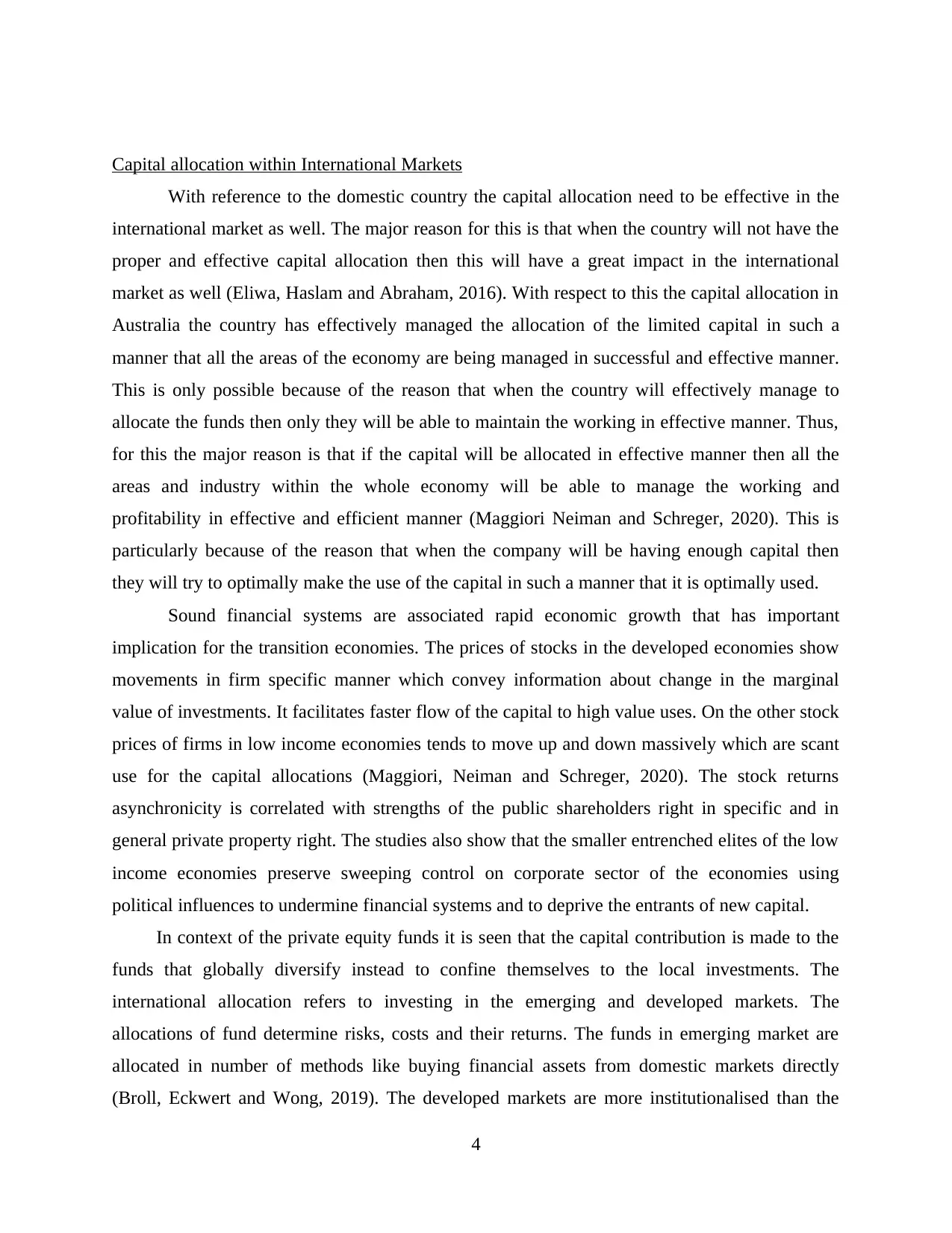
Capital allocation within International Markets
With reference to the domestic country the capital allocation need to be effective in the
international market as well. The major reason for this is that when the country will not have the
proper and effective capital allocation then this will have a great impact in the international
market as well (Eliwa, Haslam and Abraham, 2016). With respect to this the capital allocation in
Australia the country has effectively managed the allocation of the limited capital in such a
manner that all the areas of the economy are being managed in successful and effective manner.
This is only possible because of the reason that when the country will effectively manage to
allocate the funds then only they will be able to maintain the working in effective manner. Thus,
for this the major reason is that if the capital will be allocated in effective manner then all the
areas and industry within the whole economy will be able to manage the working and
profitability in effective and efficient manner (Maggiori Neiman and Schreger, 2020). This is
particularly because of the reason that when the company will be having enough capital then
they will try to optimally make the use of the capital in such a manner that it is optimally used.
Sound financial systems are associated rapid economic growth that has important
implication for the transition economies. The prices of stocks in the developed economies show
movements in firm specific manner which convey information about change in the marginal
value of investments. It facilitates faster flow of the capital to high value uses. On the other stock
prices of firms in low income economies tends to move up and down massively which are scant
use for the capital allocations (Maggiori, Neiman and Schreger, 2020). The stock returns
asynchronicity is correlated with strengths of the public shareholders right in specific and in
general private property right. The studies also show that the smaller entrenched elites of the low
income economies preserve sweeping control on corporate sector of the economies using
political influences to undermine financial systems and to deprive the entrants of new capital.
In context of the private equity funds it is seen that the capital contribution is made to the
funds that globally diversify instead to confine themselves to the local investments. The
international allocation refers to investing in the emerging and developed markets. The
allocations of fund determine risks, costs and their returns. The funds in emerging market are
allocated in number of methods like buying financial assets from domestic markets directly
(Broll, Eckwert and Wong, 2019). The developed markets are more institutionalised than the
4
With reference to the domestic country the capital allocation need to be effective in the
international market as well. The major reason for this is that when the country will not have the
proper and effective capital allocation then this will have a great impact in the international
market as well (Eliwa, Haslam and Abraham, 2016). With respect to this the capital allocation in
Australia the country has effectively managed the allocation of the limited capital in such a
manner that all the areas of the economy are being managed in successful and effective manner.
This is only possible because of the reason that when the country will effectively manage to
allocate the funds then only they will be able to maintain the working in effective manner. Thus,
for this the major reason is that if the capital will be allocated in effective manner then all the
areas and industry within the whole economy will be able to manage the working and
profitability in effective and efficient manner (Maggiori Neiman and Schreger, 2020). This is
particularly because of the reason that when the company will be having enough capital then
they will try to optimally make the use of the capital in such a manner that it is optimally used.
Sound financial systems are associated rapid economic growth that has important
implication for the transition economies. The prices of stocks in the developed economies show
movements in firm specific manner which convey information about change in the marginal
value of investments. It facilitates faster flow of the capital to high value uses. On the other stock
prices of firms in low income economies tends to move up and down massively which are scant
use for the capital allocations (Maggiori, Neiman and Schreger, 2020). The stock returns
asynchronicity is correlated with strengths of the public shareholders right in specific and in
general private property right. The studies also show that the smaller entrenched elites of the low
income economies preserve sweeping control on corporate sector of the economies using
political influences to undermine financial systems and to deprive the entrants of new capital.
In context of the private equity funds it is seen that the capital contribution is made to the
funds that globally diversify instead to confine themselves to the local investments. The
international allocation refers to investing in the emerging and developed markets. The
allocations of fund determine risks, costs and their returns. The funds in emerging market are
allocated in number of methods like buying financial assets from domestic markets directly
(Broll, Eckwert and Wong, 2019). The developed markets are more institutionalised than the
4
⊘ This is a preview!⊘
Do you want full access?
Subscribe today to unlock all pages.

Trusted by 1+ million students worldwide
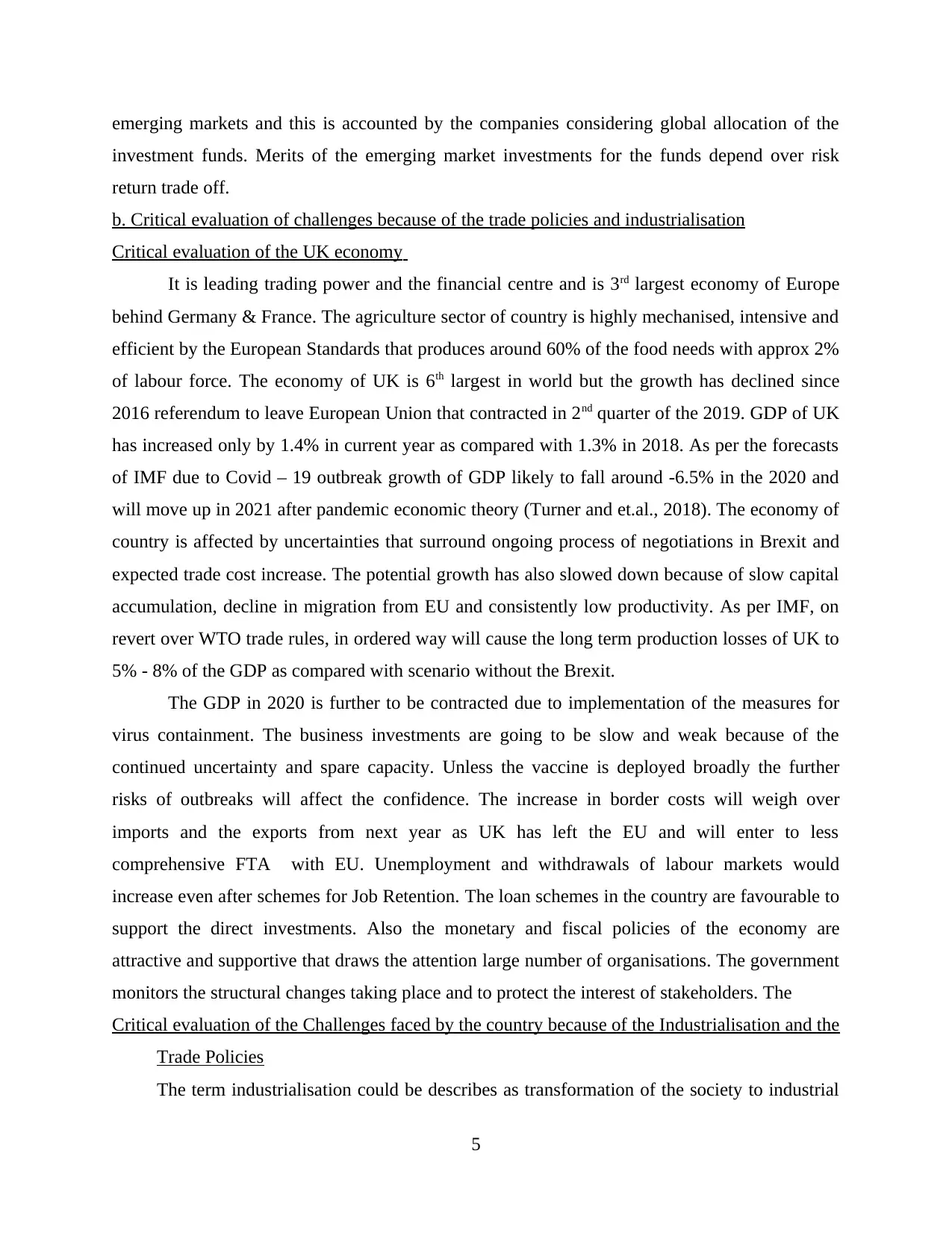
emerging markets and this is accounted by the companies considering global allocation of the
investment funds. Merits of the emerging market investments for the funds depend over risk
return trade off.
b. Critical evaluation of challenges because of the trade policies and industrialisation
Critical evaluation of the UK economy
It is leading trading power and the financial centre and is 3rd largest economy of Europe
behind Germany & France. The agriculture sector of country is highly mechanised, intensive and
efficient by the European Standards that produces around 60% of the food needs with approx 2%
of labour force. The economy of UK is 6th largest in world but the growth has declined since
2016 referendum to leave European Union that contracted in 2nd quarter of the 2019. GDP of UK
has increased only by 1.4% in current year as compared with 1.3% in 2018. As per the forecasts
of IMF due to Covid – 19 outbreak growth of GDP likely to fall around -6.5% in the 2020 and
will move up in 2021 after pandemic economic theory (Turner and et.al., 2018). The economy of
country is affected by uncertainties that surround ongoing process of negotiations in Brexit and
expected trade cost increase. The potential growth has also slowed down because of slow capital
accumulation, decline in migration from EU and consistently low productivity. As per IMF, on
revert over WTO trade rules, in ordered way will cause the long term production losses of UK to
5% - 8% of the GDP as compared with scenario without the Brexit.
The GDP in 2020 is further to be contracted due to implementation of the measures for
virus containment. The business investments are going to be slow and weak because of the
continued uncertainty and spare capacity. Unless the vaccine is deployed broadly the further
risks of outbreaks will affect the confidence. The increase in border costs will weigh over
imports and the exports from next year as UK has left the EU and will enter to less
comprehensive FTA with EU. Unemployment and withdrawals of labour markets would
increase even after schemes for Job Retention. The loan schemes in the country are favourable to
support the direct investments. Also the monetary and fiscal policies of the economy are
attractive and supportive that draws the attention large number of organisations. The government
monitors the structural changes taking place and to protect the interest of stakeholders. The
Critical evaluation of the Challenges faced by the country because of the Industrialisation and the
Trade Policies
The term industrialisation could be describes as transformation of the society to industrial
5
investment funds. Merits of the emerging market investments for the funds depend over risk
return trade off.
b. Critical evaluation of challenges because of the trade policies and industrialisation
Critical evaluation of the UK economy
It is leading trading power and the financial centre and is 3rd largest economy of Europe
behind Germany & France. The agriculture sector of country is highly mechanised, intensive and
efficient by the European Standards that produces around 60% of the food needs with approx 2%
of labour force. The economy of UK is 6th largest in world but the growth has declined since
2016 referendum to leave European Union that contracted in 2nd quarter of the 2019. GDP of UK
has increased only by 1.4% in current year as compared with 1.3% in 2018. As per the forecasts
of IMF due to Covid – 19 outbreak growth of GDP likely to fall around -6.5% in the 2020 and
will move up in 2021 after pandemic economic theory (Turner and et.al., 2018). The economy of
country is affected by uncertainties that surround ongoing process of negotiations in Brexit and
expected trade cost increase. The potential growth has also slowed down because of slow capital
accumulation, decline in migration from EU and consistently low productivity. As per IMF, on
revert over WTO trade rules, in ordered way will cause the long term production losses of UK to
5% - 8% of the GDP as compared with scenario without the Brexit.
The GDP in 2020 is further to be contracted due to implementation of the measures for
virus containment. The business investments are going to be slow and weak because of the
continued uncertainty and spare capacity. Unless the vaccine is deployed broadly the further
risks of outbreaks will affect the confidence. The increase in border costs will weigh over
imports and the exports from next year as UK has left the EU and will enter to less
comprehensive FTA with EU. Unemployment and withdrawals of labour markets would
increase even after schemes for Job Retention. The loan schemes in the country are favourable to
support the direct investments. Also the monetary and fiscal policies of the economy are
attractive and supportive that draws the attention large number of organisations. The government
monitors the structural changes taking place and to protect the interest of stakeholders. The
Critical evaluation of the Challenges faced by the country because of the Industrialisation and the
Trade Policies
The term industrialisation could be describes as transformation of the society to industrial
5
Paraphrase This Document
Need a fresh take? Get an instant paraphrase of this document with our AI Paraphraser
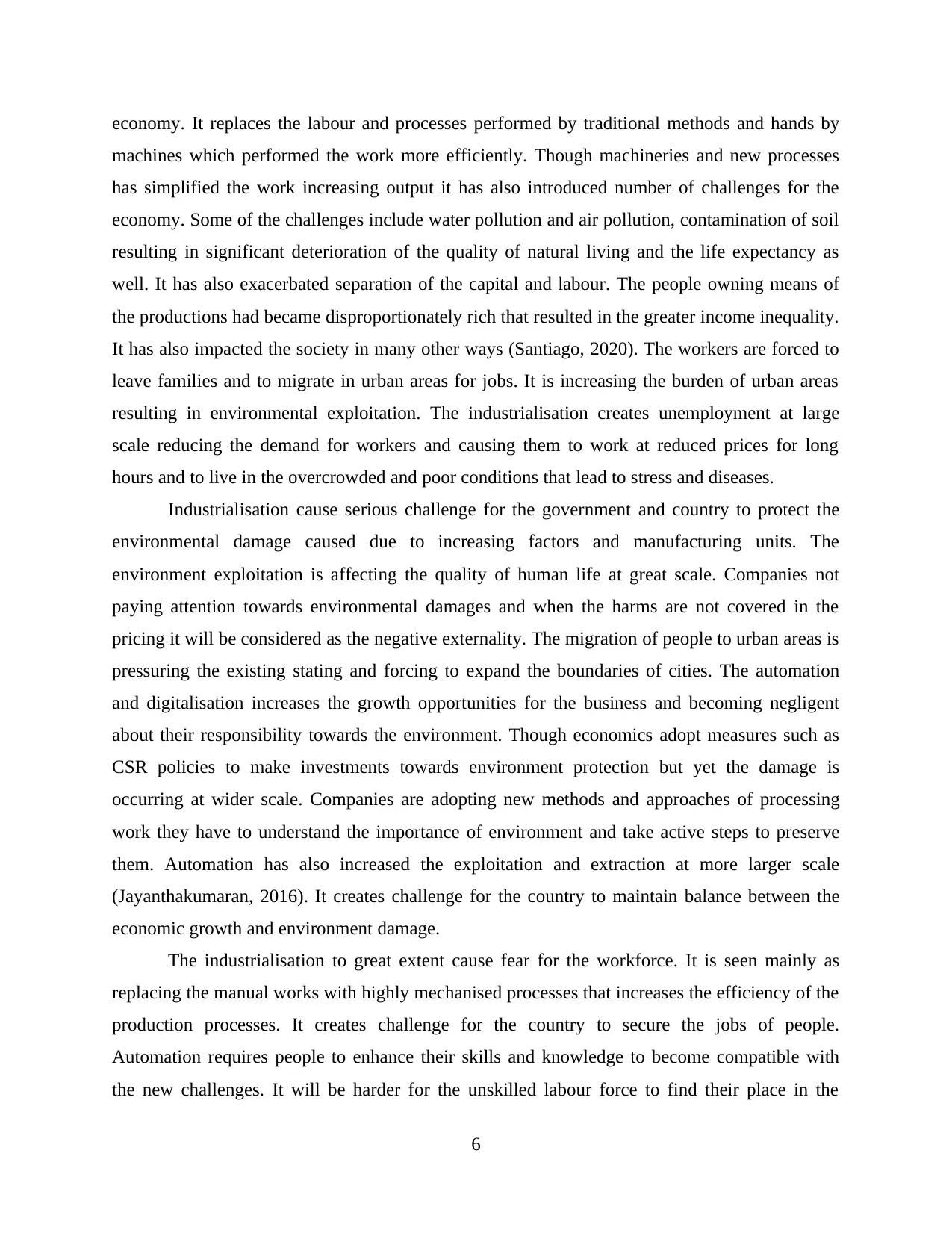
economy. It replaces the labour and processes performed by traditional methods and hands by
machines which performed the work more efficiently. Though machineries and new processes
has simplified the work increasing output it has also introduced number of challenges for the
economy. Some of the challenges include water pollution and air pollution, contamination of soil
resulting in significant deterioration of the quality of natural living and the life expectancy as
well. It has also exacerbated separation of the capital and labour. The people owning means of
the productions had became disproportionately rich that resulted in the greater income inequality.
It has also impacted the society in many other ways (Santiago, 2020). The workers are forced to
leave families and to migrate in urban areas for jobs. It is increasing the burden of urban areas
resulting in environmental exploitation. The industrialisation creates unemployment at large
scale reducing the demand for workers and causing them to work at reduced prices for long
hours and to live in the overcrowded and poor conditions that lead to stress and diseases.
Industrialisation cause serious challenge for the government and country to protect the
environmental damage caused due to increasing factors and manufacturing units. The
environment exploitation is affecting the quality of human life at great scale. Companies not
paying attention towards environmental damages and when the harms are not covered in the
pricing it will be considered as the negative externality. The migration of people to urban areas is
pressuring the existing stating and forcing to expand the boundaries of cities. The automation
and digitalisation increases the growth opportunities for the business and becoming negligent
about their responsibility towards the environment. Though economics adopt measures such as
CSR policies to make investments towards environment protection but yet the damage is
occurring at wider scale. Companies are adopting new methods and approaches of processing
work they have to understand the importance of environment and take active steps to preserve
them. Automation has also increased the exploitation and extraction at more larger scale
(Jayanthakumaran, 2016). It creates challenge for the country to maintain balance between the
economic growth and environment damage.
The industrialisation to great extent cause fear for the workforce. It is seen mainly as
replacing the manual works with highly mechanised processes that increases the efficiency of the
production processes. It creates challenge for the country to secure the jobs of people.
Automation requires people to enhance their skills and knowledge to become compatible with
the new challenges. It will be harder for the unskilled labour force to find their place in the
6
machines which performed the work more efficiently. Though machineries and new processes
has simplified the work increasing output it has also introduced number of challenges for the
economy. Some of the challenges include water pollution and air pollution, contamination of soil
resulting in significant deterioration of the quality of natural living and the life expectancy as
well. It has also exacerbated separation of the capital and labour. The people owning means of
the productions had became disproportionately rich that resulted in the greater income inequality.
It has also impacted the society in many other ways (Santiago, 2020). The workers are forced to
leave families and to migrate in urban areas for jobs. It is increasing the burden of urban areas
resulting in environmental exploitation. The industrialisation creates unemployment at large
scale reducing the demand for workers and causing them to work at reduced prices for long
hours and to live in the overcrowded and poor conditions that lead to stress and diseases.
Industrialisation cause serious challenge for the government and country to protect the
environmental damage caused due to increasing factors and manufacturing units. The
environment exploitation is affecting the quality of human life at great scale. Companies not
paying attention towards environmental damages and when the harms are not covered in the
pricing it will be considered as the negative externality. The migration of people to urban areas is
pressuring the existing stating and forcing to expand the boundaries of cities. The automation
and digitalisation increases the growth opportunities for the business and becoming negligent
about their responsibility towards the environment. Though economics adopt measures such as
CSR policies to make investments towards environment protection but yet the damage is
occurring at wider scale. Companies are adopting new methods and approaches of processing
work they have to understand the importance of environment and take active steps to preserve
them. Automation has also increased the exploitation and extraction at more larger scale
(Jayanthakumaran, 2016). It creates challenge for the country to maintain balance between the
economic growth and environment damage.
The industrialisation to great extent cause fear for the workforce. It is seen mainly as
replacing the manual works with highly mechanised processes that increases the efficiency of the
production processes. It creates challenge for the country to secure the jobs of people.
Automation requires people to enhance their skills and knowledge to become compatible with
the new challenges. It will be harder for the unskilled labour force to find their place in the
6
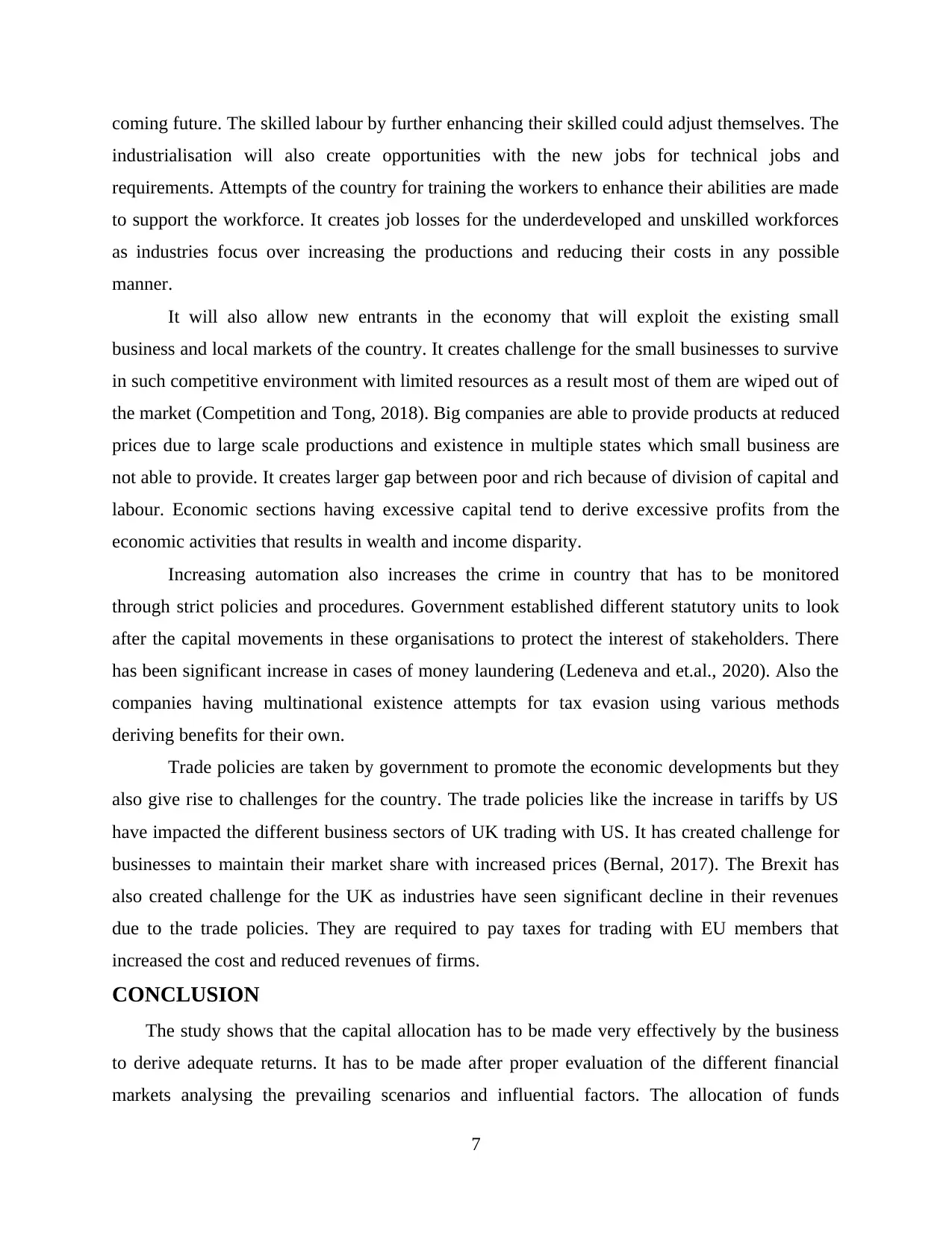
coming future. The skilled labour by further enhancing their skilled could adjust themselves. The
industrialisation will also create opportunities with the new jobs for technical jobs and
requirements. Attempts of the country for training the workers to enhance their abilities are made
to support the workforce. It creates job losses for the underdeveloped and unskilled workforces
as industries focus over increasing the productions and reducing their costs in any possible
manner.
It will also allow new entrants in the economy that will exploit the existing small
business and local markets of the country. It creates challenge for the small businesses to survive
in such competitive environment with limited resources as a result most of them are wiped out of
the market (Competition and Tong, 2018). Big companies are able to provide products at reduced
prices due to large scale productions and existence in multiple states which small business are
not able to provide. It creates larger gap between poor and rich because of division of capital and
labour. Economic sections having excessive capital tend to derive excessive profits from the
economic activities that results in wealth and income disparity.
Increasing automation also increases the crime in country that has to be monitored
through strict policies and procedures. Government established different statutory units to look
after the capital movements in these organisations to protect the interest of stakeholders. There
has been significant increase in cases of money laundering (Ledeneva and et.al., 2020). Also the
companies having multinational existence attempts for tax evasion using various methods
deriving benefits for their own.
Trade policies are taken by government to promote the economic developments but they
also give rise to challenges for the country. The trade policies like the increase in tariffs by US
have impacted the different business sectors of UK trading with US. It has created challenge for
businesses to maintain their market share with increased prices (Bernal, 2017). The Brexit has
also created challenge for the UK as industries have seen significant decline in their revenues
due to the trade policies. They are required to pay taxes for trading with EU members that
increased the cost and reduced revenues of firms.
CONCLUSION
The study shows that the capital allocation has to be made very effectively by the business
to derive adequate returns. It has to be made after proper evaluation of the different financial
markets analysing the prevailing scenarios and influential factors. The allocation of funds
7
industrialisation will also create opportunities with the new jobs for technical jobs and
requirements. Attempts of the country for training the workers to enhance their abilities are made
to support the workforce. It creates job losses for the underdeveloped and unskilled workforces
as industries focus over increasing the productions and reducing their costs in any possible
manner.
It will also allow new entrants in the economy that will exploit the existing small
business and local markets of the country. It creates challenge for the small businesses to survive
in such competitive environment with limited resources as a result most of them are wiped out of
the market (Competition and Tong, 2018). Big companies are able to provide products at reduced
prices due to large scale productions and existence in multiple states which small business are
not able to provide. It creates larger gap between poor and rich because of division of capital and
labour. Economic sections having excessive capital tend to derive excessive profits from the
economic activities that results in wealth and income disparity.
Increasing automation also increases the crime in country that has to be monitored
through strict policies and procedures. Government established different statutory units to look
after the capital movements in these organisations to protect the interest of stakeholders. There
has been significant increase in cases of money laundering (Ledeneva and et.al., 2020). Also the
companies having multinational existence attempts for tax evasion using various methods
deriving benefits for their own.
Trade policies are taken by government to promote the economic developments but they
also give rise to challenges for the country. The trade policies like the increase in tariffs by US
have impacted the different business sectors of UK trading with US. It has created challenge for
businesses to maintain their market share with increased prices (Bernal, 2017). The Brexit has
also created challenge for the UK as industries have seen significant decline in their revenues
due to the trade policies. They are required to pay taxes for trading with EU members that
increased the cost and reduced revenues of firms.
CONCLUSION
The study shows that the capital allocation has to be made very effectively by the business
to derive adequate returns. It has to be made after proper evaluation of the different financial
markets analysing the prevailing scenarios and influential factors. The allocation of funds
7
⊘ This is a preview!⊘
Do you want full access?
Subscribe today to unlock all pages.

Trusted by 1+ million students worldwide
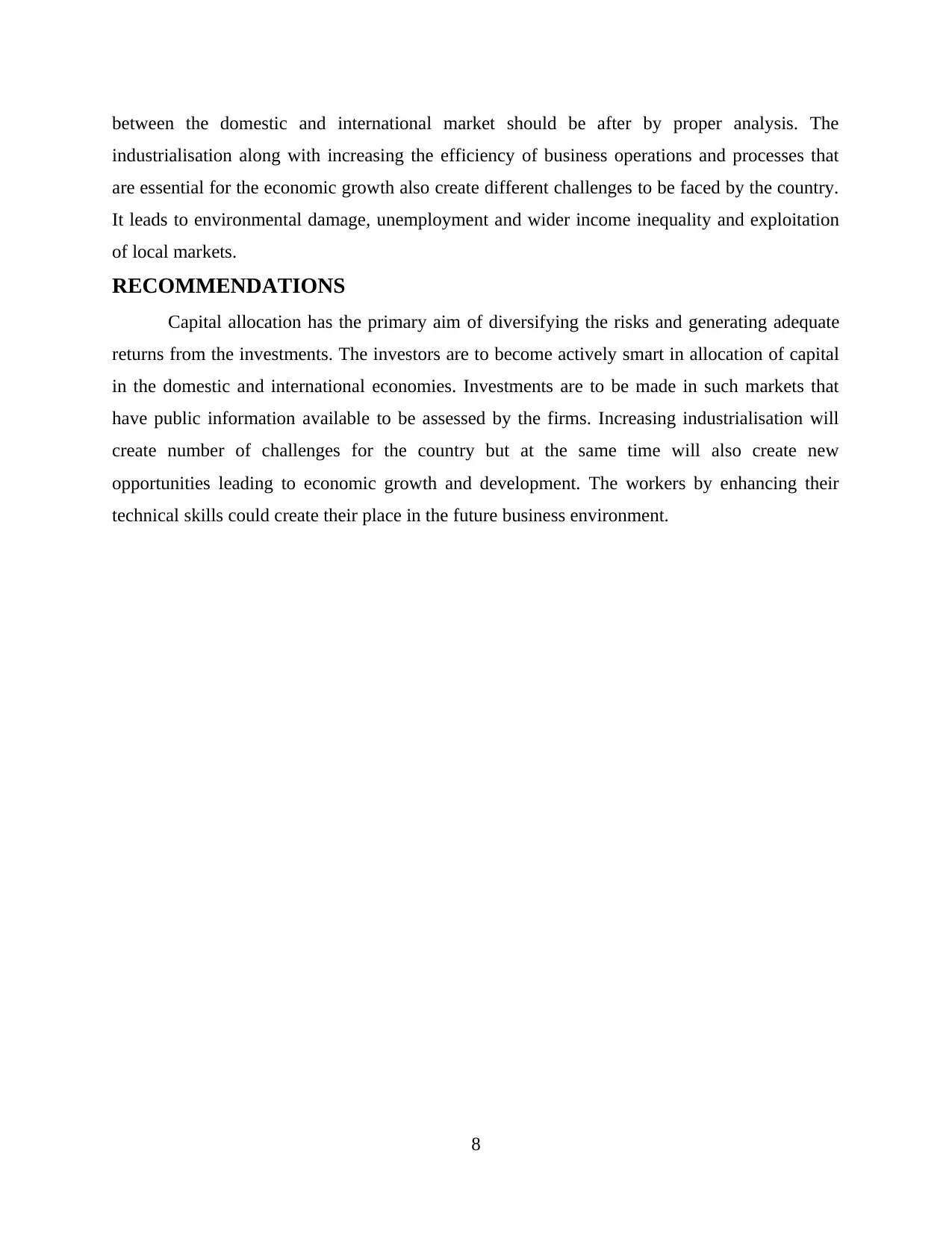
between the domestic and international market should be after by proper analysis. The
industrialisation along with increasing the efficiency of business operations and processes that
are essential for the economic growth also create different challenges to be faced by the country.
It leads to environmental damage, unemployment and wider income inequality and exploitation
of local markets.
RECOMMENDATIONS
Capital allocation has the primary aim of diversifying the risks and generating adequate
returns from the investments. The investors are to become actively smart in allocation of capital
in the domestic and international economies. Investments are to be made in such markets that
have public information available to be assessed by the firms. Increasing industrialisation will
create number of challenges for the country but at the same time will also create new
opportunities leading to economic growth and development. The workers by enhancing their
technical skills could create their place in the future business environment.
8
industrialisation along with increasing the efficiency of business operations and processes that
are essential for the economic growth also create different challenges to be faced by the country.
It leads to environmental damage, unemployment and wider income inequality and exploitation
of local markets.
RECOMMENDATIONS
Capital allocation has the primary aim of diversifying the risks and generating adequate
returns from the investments. The investors are to become actively smart in allocation of capital
in the domestic and international economies. Investments are to be made in such markets that
have public information available to be assessed by the firms. Increasing industrialisation will
create number of challenges for the country but at the same time will also create new
opportunities leading to economic growth and development. The workers by enhancing their
technical skills could create their place in the future business environment.
8
Paraphrase This Document
Need a fresh take? Get an instant paraphrase of this document with our AI Paraphraser
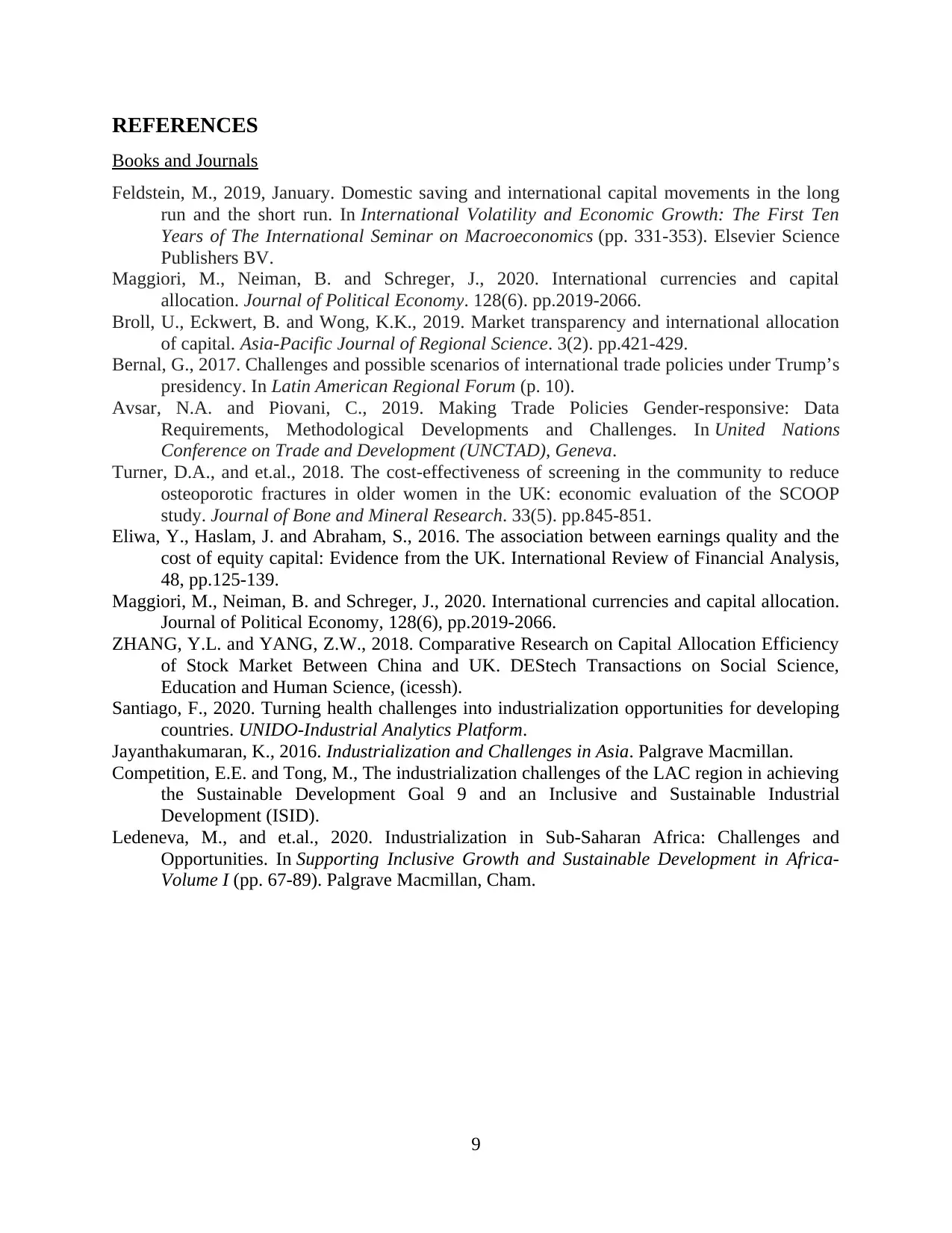
REFERENCES
Books and Journals
Feldstein, M., 2019, January. Domestic saving and international capital movements in the long
run and the short run. In International Volatility and Economic Growth: The First Ten
Years of The International Seminar on Macroeconomics (pp. 331-353). Elsevier Science
Publishers BV.
Maggiori, M., Neiman, B. and Schreger, J., 2020. International currencies and capital
allocation. Journal of Political Economy. 128(6). pp.2019-2066.
Broll, U., Eckwert, B. and Wong, K.K., 2019. Market transparency and international allocation
of capital. Asia-Pacific Journal of Regional Science. 3(2). pp.421-429.
Bernal, G., 2017. Challenges and possible scenarios of international trade policies under Trump’s
presidency. In Latin American Regional Forum (p. 10).
Avsar, N.A. and Piovani, C., 2019. Making Trade Policies Gender-responsive: Data
Requirements, Methodological Developments and Challenges. In United Nations
Conference on Trade and Development (UNCTAD), Geneva.
Turner, D.A., and et.al., 2018. The cost‐effectiveness of screening in the community to reduce
osteoporotic fractures in older women in the UK: economic evaluation of the SCOOP
study. Journal of Bone and Mineral Research. 33(5). pp.845-851.
Eliwa, Y., Haslam, J. and Abraham, S., 2016. The association between earnings quality and the
cost of equity capital: Evidence from the UK. International Review of Financial Analysis,
48, pp.125-139.
Maggiori, M., Neiman, B. and Schreger, J., 2020. International currencies and capital allocation.
Journal of Political Economy, 128(6), pp.2019-2066.
ZHANG, Y.L. and YANG, Z.W., 2018. Comparative Research on Capital Allocation Efficiency
of Stock Market Between China and UK. DEStech Transactions on Social Science,
Education and Human Science, (icessh).
Santiago, F., 2020. Turning health challenges into industrialization opportunities for developing
countries. UNIDO-Industrial Analytics Platform.
Jayanthakumaran, K., 2016. Industrialization and Challenges in Asia. Palgrave Macmillan.
Competition, E.E. and Tong, M., The industrialization challenges of the LAC region in achieving
the Sustainable Development Goal 9 and an Inclusive and Sustainable Industrial
Development (ISID).
Ledeneva, M., and et.al., 2020. Industrialization in Sub-Saharan Africa: Challenges and
Opportunities. In Supporting Inclusive Growth and Sustainable Development in Africa-
Volume I (pp. 67-89). Palgrave Macmillan, Cham.
9
Books and Journals
Feldstein, M., 2019, January. Domestic saving and international capital movements in the long
run and the short run. In International Volatility and Economic Growth: The First Ten
Years of The International Seminar on Macroeconomics (pp. 331-353). Elsevier Science
Publishers BV.
Maggiori, M., Neiman, B. and Schreger, J., 2020. International currencies and capital
allocation. Journal of Political Economy. 128(6). pp.2019-2066.
Broll, U., Eckwert, B. and Wong, K.K., 2019. Market transparency and international allocation
of capital. Asia-Pacific Journal of Regional Science. 3(2). pp.421-429.
Bernal, G., 2017. Challenges and possible scenarios of international trade policies under Trump’s
presidency. In Latin American Regional Forum (p. 10).
Avsar, N.A. and Piovani, C., 2019. Making Trade Policies Gender-responsive: Data
Requirements, Methodological Developments and Challenges. In United Nations
Conference on Trade and Development (UNCTAD), Geneva.
Turner, D.A., and et.al., 2018. The cost‐effectiveness of screening in the community to reduce
osteoporotic fractures in older women in the UK: economic evaluation of the SCOOP
study. Journal of Bone and Mineral Research. 33(5). pp.845-851.
Eliwa, Y., Haslam, J. and Abraham, S., 2016. The association between earnings quality and the
cost of equity capital: Evidence from the UK. International Review of Financial Analysis,
48, pp.125-139.
Maggiori, M., Neiman, B. and Schreger, J., 2020. International currencies and capital allocation.
Journal of Political Economy, 128(6), pp.2019-2066.
ZHANG, Y.L. and YANG, Z.W., 2018. Comparative Research on Capital Allocation Efficiency
of Stock Market Between China and UK. DEStech Transactions on Social Science,
Education and Human Science, (icessh).
Santiago, F., 2020. Turning health challenges into industrialization opportunities for developing
countries. UNIDO-Industrial Analytics Platform.
Jayanthakumaran, K., 2016. Industrialization and Challenges in Asia. Palgrave Macmillan.
Competition, E.E. and Tong, M., The industrialization challenges of the LAC region in achieving
the Sustainable Development Goal 9 and an Inclusive and Sustainable Industrial
Development (ISID).
Ledeneva, M., and et.al., 2020. Industrialization in Sub-Saharan Africa: Challenges and
Opportunities. In Supporting Inclusive Growth and Sustainable Development in Africa-
Volume I (pp. 67-89). Palgrave Macmillan, Cham.
9
1 out of 11
Related Documents
Your All-in-One AI-Powered Toolkit for Academic Success.
+13062052269
info@desklib.com
Available 24*7 on WhatsApp / Email
![[object Object]](/_next/static/media/star-bottom.7253800d.svg)
Unlock your academic potential
Copyright © 2020–2026 A2Z Services. All Rights Reserved. Developed and managed by ZUCOL.





